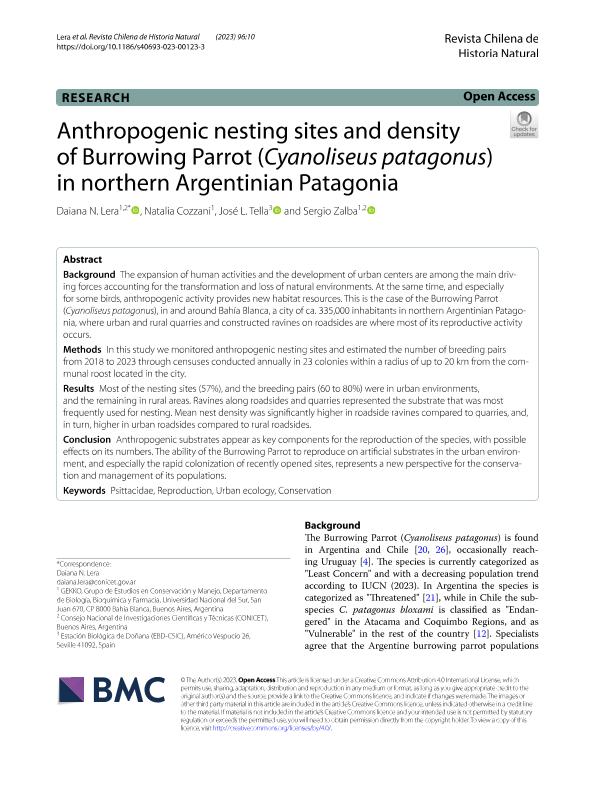Artículo
Anthropogenic nesting sites and density of Burrowing Parrot (Cyanoliseus patagonus) in northern Argentinian Patagonia
Fecha de publicación:
12/2023
Editorial:
Sociedad de Biología de Chile
Revista:
Revista Chilena de Historia Natural
ISSN:
0716-078X
e-ISSN:
0717-6317
Idioma:
Inglés
Tipo de recurso:
Artículo publicado
Clasificación temática:
Resumen
Background: The expansion of human activities and the development of urban centers are among the main driving forces accounting for the transformation and loss of natural environments. At the same time, and especially for some birds, anthropogenic activity provides new habitat resources. This is the case of the Burrowing Parrot (Cyanoliseus patagonus), in and around Bahía Blanca, a city of ca. 335,000 inhabitants in northern Argentinian Patagonia, where urban and rural quarries and constructed ravines on roadsides are where most of its reproductive activity occurs. Methods: In this study we monitored anthropogenic nesting sites and estimated the number of breeding pairs from 2018 to 2023 through censuses conducted annually in 23 colonies within a radius of up to 20 km from the communal roost located in the city. Results: Most of the nesting sites (57%), and the breeding pairs (60 to 80%) were in urban environments, and the remaining in rural areas. Ravines along roadsides and quarries represented the substrate that was most frequently used for nesting. Mean nest density was significantly higher in roadside ravines compared to quarries, and, in turn, higher in urban roadsides compared to rural roadsides. Conclusion: Anthropogenic substrates appear as key components for the reproduction of the species, with possible effects on its numbers. The ability of the Burrowing Parrot to reproduce on artificial substrates in the urban environment, and especially the rapid colonization of recently opened sites, represents a new perspective for the conservation and management of its populations.
Palabras clave:
CONSERVATION
,
PSITTACIDAE
,
REPRODUCTION
,
URBAN ECOLOGY
Archivos asociados
Licencia
Identificadores
Colecciones
Articulos(CCT - BAHIA BLANCA)
Articulos de CTRO.CIENTIFICO TECNOL.CONICET - BAHIA BLANCA
Articulos de CTRO.CIENTIFICO TECNOL.CONICET - BAHIA BLANCA
Citación
Lera, Daiana Noelia; Cozzani, Natalia Carolina; Tella Escobedo, José Luis; Zalba, Sergio Martín; Anthropogenic nesting sites and density of Burrowing Parrot (Cyanoliseus patagonus) in northern Argentinian Patagonia; Sociedad de Biología de Chile; Revista Chilena de Historia Natural; 96; 1; 12-2023; 1-9
Compartir
Altmétricas




